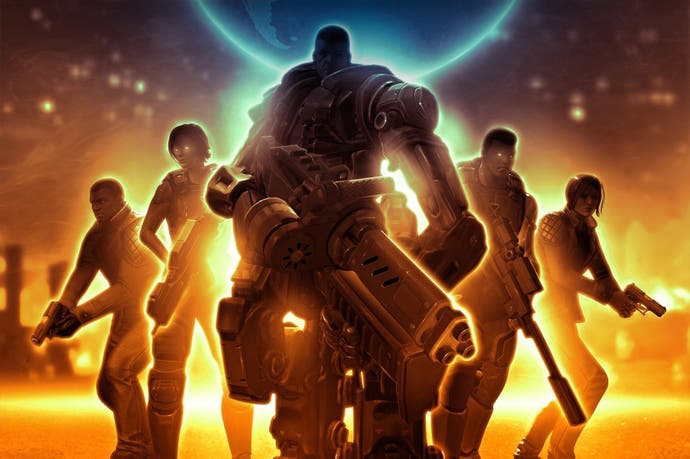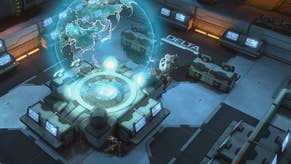XCOM: Enemy Within review
I've got you under my skin.
When it comes to expanding upon on an original concept, Firaxis is not averse to getting its hands dirty. After spending the last couple of years reworking, refining and enhancing key elements of Civilization 5, the developer has now slapped XCOM: Enemy Unknown on the operating table, rolled up its sleeves and poked at the innards of what was already one of the best strategy games around.
As a result, XCOM: Enemy Within benefits from the kind of base-level modification that typifies the genetically enhanced soldiers and mechanised brutes that serve as its own headline additions. It's not perfect, but Firaxis has enhanced XCOM's core to create an unquestionable improvement on what went before.
These modifications start by smoothing a number of minor imperfections in the original formula. There's a host of new maps to drastically lessen the need to reuse environments, there are medals available to bestow upon worthy soldiers and there's a much needed - if still too basic - reworking of Enemy Unknown's clunky inventory system, making it easier to redistribute equipment.
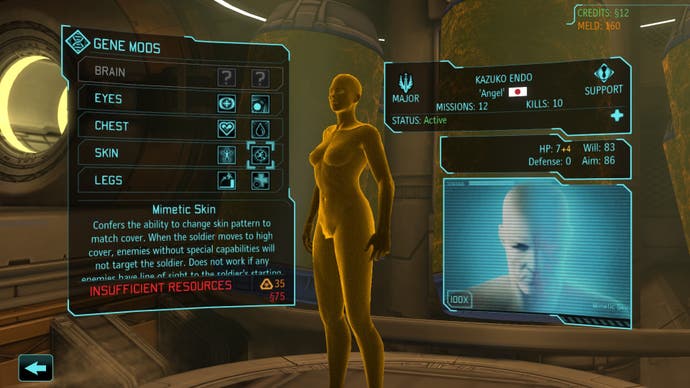
There's more here than just a bulleted list of individual additions, though. Just as Firaxis has achieved with Civilization 5, there are higher-level changes that persist throughout the entire campaign and affect long-term decisions. These factors facilitate a greater choice of approach while at the same time introducing more quandaries to ponder, tasks to prioritise and demands to meet.
The catalyst for a significant portion of the new content is introduced early on in the form of MELD, an alien substance that, for reasons barely touched upon, can be utilised as a resource with which to secure Enemy Within's most powerful modifications. MELD is collected from containers - typically two per level - but because of its inherent volatility it has a finite lifespan, and so expires after a random number of turns if it's not collected.
At this point, Enemy Unknown veterans may have an inkling of the devilish predicament this presents, because it can force more rapid progress through a level than conventional wisdom would usually deem prudent. As the number of turns that a MELD container will last for is randomised and isn't revealed until you have one in your line of sight, it's entirely possible for either one or both of these precious containers to be lost before you've even laid eyes on them.
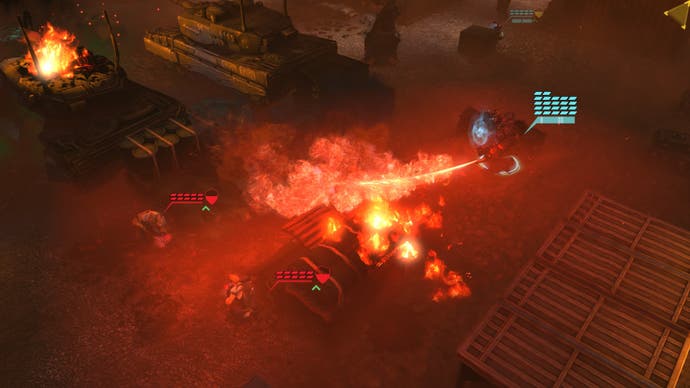
Consequently, you'll find yourself working against your better judgement and risking soldiers in a bid to retrieve canisters and, because this is XCOM where soldiers' deaths are permanent, these risks will invariably yield some bitter losses. MELD retrieval slots wonderfully into XCOM's balance of risk and reward; it's at once a horrible and a brilliant addition.
Assuming you can successfully secure enough MELD (and still have enough soldiers alive on which to spend it), genetic modification and the construction of mechanised infantry await. Both require a separate facility to be built, which means two fewer spaces for vital workshops, power generators and satellite uplinks - but you'll be hard pressed to resist the temptation to create a handful of super soldiers. So Enemy Within once more asks questions of you that Enemy Unknown did not.
While genetic modification grants a number of low-key bonuses such as decreased recovery time from wounds and minor stat boosts, it's the MEC soldiers that demand the most attention. Encasing a volunteer in a suit of mechanised armour grants access to heavier weapons and boosts defence and health, but it also robs them of the ability to utilise cover or to carry inventory items, ensuring that where there are gains to be had, there's also a price to be exacted.
Initially, MEC units feel overpowered, but the high running costs associated with creating and upgrading the suits makes losing one tongue-bitingly painful. It's also unwise to allow your MECs to clean up on the early levels as there's the ever-present need to spread promotions throughout the soldier roster so that units can step up to fill gaps left by felled combat vets later in the game. As with everything in XCOM, playing around in the gene pool brings with it a whole mess of decisions to be made and choices to be balanced.
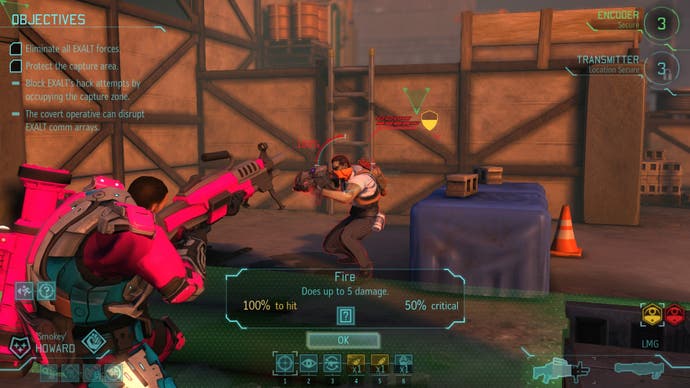
It's a shame, then, that Firaxis didn't make more of the ethical considerations of tinkering with genetics or the traumatic amputations required for a soldier to pilot a MEC. While these new additions will no doubt be too tasty to pass up on your first play-through, they are nonetheless entirely optional and should you decide that your soldiers' humanity is too great a price to pay for the war effort, resources can instead be spent on additional Foundry projects or invested in the Soldier Training School.
Outside of one or two lines of incidental dialogue and a promising opening quote from the late futurist (and former head of MENSA) Buckminster Fuller, there's little in the way of handwringing to mark the sacrifices being made by your troops. This level of narrative ambiguity carries over into the terrorist cell known as EXALT, which persistently plagues your efforts from around a third of the way into the game.
With their sharp pinstripe trousers suits and rolled-up shirt sleeves, there's definitely something a tad The Bureau: XCOM Declassified about the members of this organisation, but their origins are never fully explored. Instead, they pop up from time to time to disrupt your research plans and sow discord in nations that are already teetering on the verge of full-scale panic.
Building additional labs can counter this disruption to a degree (and goes some way to making labs more essential than they were previously), while sending a single team member on covert, intel-gathering operations is the only way to eventually ascertain which traitorous country is harbouring the EXALT HQ. As with those genetic modification paths, dealing with the EXALT threat is an optional extra, but like so many of Enemy Within's constituent parts it feels like a fully fledged element of the game rather than an obvious bolt-on.
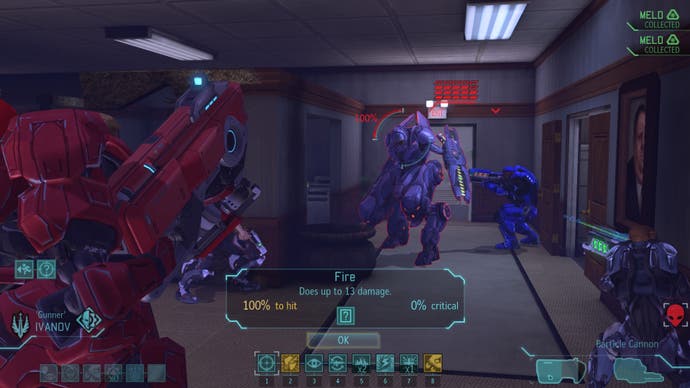
That's the biggest compliment that I can pay to Firaxis: that all of the additions have been wonderfully woven into the fabric of the game and balanced against neighbouring systems. New enemy types will seek to exploit known player strategies, existing inventory items have been rebalanced, new ones added and the additional engineering projects offer meaningful progression. There's nothing here that feels superfluous and much of this new content has been carried over to multiplayer, where you can play as EXALT forces across some of the most memorable of the new map types.
There are flaws, of course; familiar camera spasms and a refusal to recognise a valid empty space to move to, for example. There's also a new oddity that involves an animation pause after an enemy is shot, as thought the victim is assessing whether they have the health left to withstand the attack before realising that they don't and dying theatrically. XCOM vets might also feel there are some missed opportunities to address popular fan requests, but the fact that it all remains so eminently playable is testament to Firaxis' supremely confident handling of XCOM.
Enemy Within is an improvement on an already excellent game. For every decision that must be made there are several factors to consider, rarely enough money to pay for everything, and uncomfortable consequences to be faced for failure. All of this is exacerbated still further when playing on Classic difficulty or with Ironman mode enabled, where you're constantly worrying about what to do next or second guessing the action that you've just taken. Much like the genetic modifications that it champions, XCOM: Enemy Within is an experience that gets under your skin.
